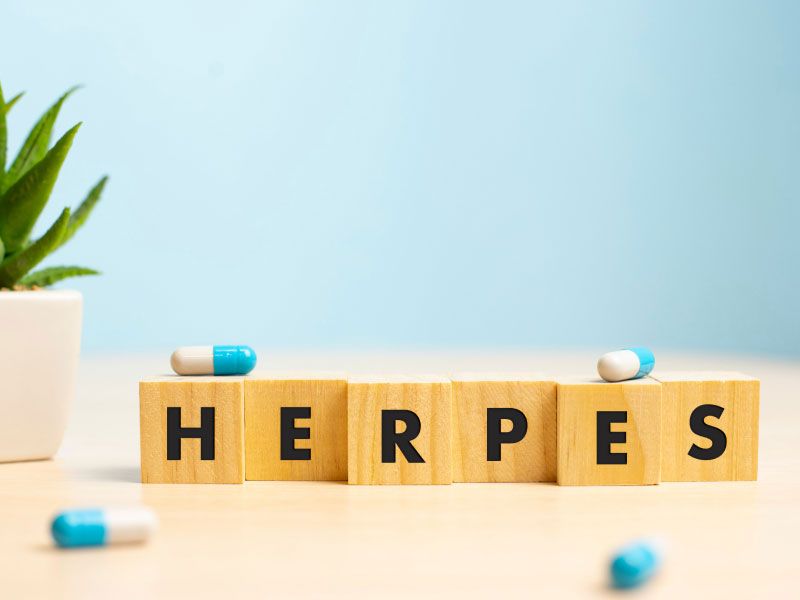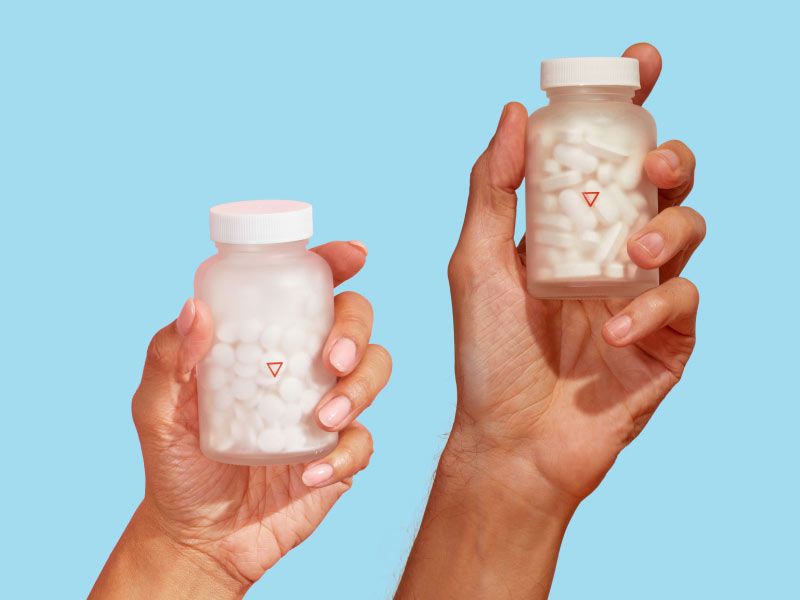
What Are Your Chances of
Getting Herpes from an
Infected Partner?
Published on May 9, 2020
Updated on April 28, 2025
Written by Kathleen Morrison
Medically Reviewed by Andrea Sleeth WHNP-BC, MSCP
Let’s get one thing straight—herpes is wildly common. Like, billions-of-people-worldwide kind of common.
So if you or your partner has it (or might have it), you're definitely not alone. Still, it’s totally normal to feel a little unsure about your own chances of getting herpes from infected partners, how it spreads, and how to navigate those convos without the weirdness. Spoiler: it’s all figure-out-able.
The truth is, the more you learn about oral and genital herpes, the more empowered you’ll feel in your sex life. You deserve to feel confident, cared for, and informed about your body and relationships. No shame—just real talk.
How does Herpes spread?
Here’s how it works: the herpes simplex virus spreads through close skin-to-skin contact while the virus is active. That might be when there’s a visible sore, or… even when there’s not.
Yep, the virus can still be hanging out even if everything looks totally fine. That’s why it’s helpful to pay attention to little things like tingles, itches, or skin that just feels a bit off. Herpes transmission can happen through kissing, oral, vaginal, or anal sex—basically, any kind of intimate contact where skin touches skin. Unfortunately, innocent contact like sharing your lip balm could also cause trouble, so you’ll need to be extra aware when you have symptoms.
And FYI, the fluid inside herpes blisters (like cold sores) carries a lot of the virus, so touching or rubbing against that area (even without a visible blister) is one way it can move from one person to another.
Even without symptoms?
Yep. That’s what makes herpes such a sneaky little virus. Some people have no clue they’ve got it until something shows up—and even then, it might be so mild they mistake it for a pimple or razor burn.
Others get signs like tingling or redness before an outbreak happens. Everybody is different, and that's totally okay. The important thing is knowing your options, tuning into your body, and talking openly with your partner.
HSV-1 versus HSV-2
There are two types of herpes: HSV-1 and HSV-2. Here’s what you need to know about them:
- HSV-1: What you think of as oral herpes. Usually found around the mouth, but can also be spread to the genital area through oral sex.
- HSV-2: This one is genital herpes. Naturally, it's typically found in the genital region, but can also show up around the mouth if it’s passed that way.
- Both can spread in either location, depending on the type of contact.
- Visible sores aren’t the only way herpes spreads—it can also spread when there are no visible symptoms, through a process called “asymptomatic shedding.”
Knowing which herpes simplex virus type you have can help you and your doctor decide on the best way to manage things.
What affects your chances of passing on Herpes?
There are a bunch of things that can influence how likely it is to pass the herpes virus to a partner, and it’s not just about visible symptoms. Here’s what plays a role:
- How often outbreaks happen: More frequent flare-ups can increase the chances.
- Your overall health: A strong immune system helps your body handle the virus better.
- Your day-to-day choices: Thoughtful, consistent habits (like taking daily prescription antivirals) can also really help.
- Timing matters: The virus is most active during an outbreak, so a little planning goes a long way.
At the end of the day, open conversations and thoughtful timing can go a long way in keeping intimacy stress-free and informed.
What if I have symptoms (or don’t)?
If you can see a blister or sore, that’s a sign the virus is super active, which makes it easier to pass on. But here's a little myth-busting moment: oral and genital herpes infections can still be active even if everything looks normal.
Some people wait to take precautions until they spot a sore, but the virus doesn't always give you a heads-up. That’s why daily prescription antiviral meds like Valacyclovir or Acyclovir can help support your sexual health journey, especially when paired with regular barrier protection. Staying consistent is a game-changer.
Wisp treatment options are available only after consultation with a licensed medical professional. You should consult with your healthcare provider before starting a new supplement or treatment regimen. Individual results may vary.
What is asymptomatic shedding?
Okay, let’s talk about something sneaky—asymptomatic shedding. This is when someone has no visible signs, but the virus is still active under the surface and can be passed to a partner.
It’s one of the reasons why regular check-ins (solo or with your partner) are so helpful. If you want to stay ahead of things, try tools like our Symptoms Quiz. You don’t need to wait until something feels off—being proactive is a form of self-care, and you deserve that peace of mind.
What should I do if someone I hooked up with tells me they have Herpes?
First, don’t freak out. Just because you hooked up with someone who is positive, doesn’t mean you have herpes. And don’t shame your partner for letting you know! Yes, it would've been better had they told you beforehand, but now you can move the conversation forward to create a basis of trust and honesty, particularly if you plan on dating this person.
Even if your encounter was a one-night stand, there is a strong chance you’ll come across someone else down the line in your personal life who has herpes. A good place to start is by gathering a little more information.
How long has your partner been diagnosed? Do they know their own body and the symptoms that occur before an outbreak? If you feel comfortable doing so, going to a doctor together to ask questions and learn more can be a great first step to staying informed about transmission (and a great way to bond!).
Can you get Herpes without having sex?
Totally valid question—and the short answer is yes. While sexual contact is one way the virus can be passed between people, it’s definitely not the only way.
Any kind of close, skin-to-skin contact can create an opportunity for the herpes simplex virus to move from one person to another. The vibe of the moment (what kind of contact you’re having, how long it lasts, whether you’re using any barriers) can all play a role in contracting herpes.
Knowing the scoop about different types of contact when it comes to sexually transmitted infections can help you make decisions that feel right for you and your relationships.
Genital to genital contact
Genital-to-genital contact is a pretty typical way for HSV-2 (genital herpes) to spread. Even if a couple thinks they’re being careful, skin brushing alone could pass the virus through invisible cuts.
Avoiding intimacy when herpes sores are active can shrink the odds. Consistent use of condoms can also help, though it doesn’t fully cover all parts that might carry the virus.
Oral contact and kisses
Yup, herpes can be passed through oral contact too—think kissing or oral sex. HSV-1 is often the culprit around the mouth, but HSV-2 can show up there, too.
That’s why it’s good to pay attention to signs like tingling, itching, or any weird feelings around the lips or inside the mouth. Even if there’s no visible blister, the virus can still be active.
Some folks choose to wait it out when they notice those early signs, while others go for barrier methods if they’re still in the mood for closeness. Whatever feels good and safe for you is the right move.
Non-sexual stuff
Okay, so it’s much less common, but technically, the virus can hang around on personal items like lip balm or razors if they’ve been in contact with a sore. Sharing those things might not be the best idea if someone’s having a flare-up.
Simple things like washing your hands after touching your face or not sharing razors when a sore’s doing its thing? Super easy habits that can help everyone feel a bit more chill about the whole situation.
What actually helps lower the risk?
When it comes to herpes, there’s no one-size-fits-all solution—and honestly, that’s kind of the beauty of it. There are lots of little things you can do that, together, help you feel more confident and in control.
Whether it’s using barriers, taking meds, or just being super honest with your partner, every bit counts. You get to build your own personal toolkit for feeling good (and safe!) in your sex life.
Condoms and other barriers
Let’s start with the classics. Condoms and dental dams are like the multitasking MVPs of safer sex. They can help cut down the chances of the virus making an unwanted appearance, especially during intimate skin-to-skin moments.
Just a heads up, though—they don’t cover everything. So while they’re a great move, they work best as part of a bigger game plan. Still, keeping them in the mix? Always a good idea.
Antiviral medications
Daily prescription herpes meds can be a total game-changer. They help keep recurrent outbreaks in check and make it way less likely for the virus to show up uninvited.
If you or your partner have herpes, taking meds consistently can really help with peace of mind. It’s one of those behind-the-scenes steps that make a big difference, like flossing, but way sexier.
Talk about it—yes, really
Okay, we know: talking about herpes or any STI can feel a little… eek. But having real convos about what’s going on with your body is important. It shows care, respect, and a whole lot of maturity.
Whether it’s, “Hey, I feel a tingle, let’s chill for now,” or “Wanna chat about what we’re comfortable with?”—those talks build trust and help you both feel safe and seen. Plus, they can help make your connection even stronger. Win-win.
Does gender matter when it comes to Herpes?
Short answer: kinda!
The way herpes shows up—and gets passed along—can look a little different depending on your body. Some people have tissue that's more sensitive, which can make it easier for the virus to find its way in.
Studies do show that people with vulvas might have higher chances of catching HSV-2 from a partner, but that’s not the whole story. It’s all about what you do with the info.
Whether you’re rocking a vulva, a penis, or something in between, having a plan (meds, barriers, honest convos) is what really helps you feel confident and in control.
Male-to-female transmission
In many cases, people with penises are more likely to pass HSV-2 to partners with vulvas. That’s partly because vaginal tissue is super absorbent and sensitive (thanks, biology).
But that doesn’t mean it’s inevitable. Daily herpes meds, timing intimacy around symptoms, and using barriers are all ways couples can help keep things low-stress.
And if you're the one managing herpes? You're already doing a ton just by being informed and proactive. Go you.
Female-to-male transmission
This also happens, just not as often, statistically speaking. But don’t let the numbers fool you. Herpes can still be passed along during close contact, especially if there's active shedding or a sore hanging around.
That’s why it's great to have your go-to toolkit. Little things can go a long way in keeping everyone feeling good and in the know.
What does Herpes look like long-term?
Here’s the good news: it does get easier. For lots of folks, herpes becomes more of a background detail than a daily stressor. Herpes outbreaks can mellow out over time, and when you’ve got a solid plan in place, it can feel a lot more manageable.
Does your transmission risk change over time?
Yep, it can! Everyone’s body is different, but research shows that outbreaks often show up less often and may become milder as the years go by. That can mean fewer moments when the virus is more likely to pass from one person to another.
Daily herpes meds can also help keep things calm behind the scenes. Just keep in mind: taking a break from your usual routine (like skipping meds or barrier methods) might mean the virus pops back up when you least expect it. So if you're thinking about changing things up, have a quick chat with your partner—or your doc!
Living with Herpes (and being okay about it)
Getting a herpes diagnosis doesn’t mean the end of good sex or real love. Honestly, it's just the start of a more open, connected, and informed relationship—especially when you're both on the same page.
Taking your medication to keep things under control can be a game-changer, and it doesn’t hurt to pay close attention to your diet and lifestyle to ensure you’re doing what you can for your immune system. Pair that with some regular check-ins (with yourself, your partner, or a trusted provider), and you've got everything you need to thrive.
At the end of the day, it’s all about feeling confident in your body, your choices, and your connection. You’ve got this.
Herpes, intimacy, and feeling good no matter what
So, can you catch herpes from a partner who has it? Technically, yes. But that doesn’t mean it’s guaranteed—or even likely—if you’ve got the right tools, info, and support.
From being tuned in to symptoms to having open, honest convos and staying consistent with treatment, there are so many ways to keep your sex life fun, connected, and confident.
At the end of the day, this is about you—your body, your boundaries, your relationships. Wisp is here to help you feel empowered and in control, with fast, discreet treatment options that meet you exactly where you are.
Ready to take charge of your sexual health—without the stress? Start your free symptoms quiz or explore Wisp’s prescription herpes treatment options today. We’ve got you.
This blog post is for informational and educational purposes only and should not be taken as professional advice. Always consult with a qualified professional before making any decisions based on the information provided here.




